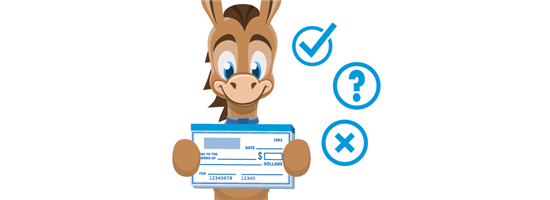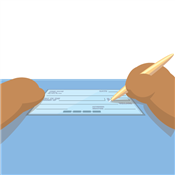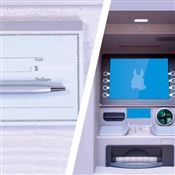How to Balance a Checkbook
Balancing your checkbook is a great way to understand your money. Find out why you should still reconcile your account, even in the digital age.
 |
Why should I balance my checkbook?
Back when checks were really common, balancing a checkbook was crucial. Checks take some time to clear, so there was a chance you thought you had more money in the bank than you actually did.
But how often do you need to write a check today? Is balancing your checkbook still relevant?
The old-school method of filling out a checkbook register isn't for everyone. But the fundamental concept of keeping tabs on your checking account is still as important as ever.
Recording your transactions and regularly comparing them against bank statements helps with a host of modern problems:
- Ensure stores and restaurants charge you correctly
- Catch fraudulent activity early on
- Solve issues with missed auto-payments
- Identify hidden fees
- Become better at managing money
Balancing a checkbook doesn't have to involve pen and paper. Up next, find out how to reconcile your account the modern way.
How to Balance a Checkbook
Balancing your account is a simple way to get familiar with your spending habits. Follow these 5 easy and effective steps to balance your checkbook.
1. Track all your transactions
 |
Create a running balance each time you spend or receive money. Add your income, including any side hustle money you make. Subtract everything you spend, including debit card payments, ATM withdrawals, and money app transfers.
How you track transactions is up to you. You can use your checkbook register, a notebook, a spreadsheet, or a budgeting app. The most important part is to account for all money that flows in and out of your checking account.
2. Review your checking account statement
 |
Once you get your monthly bank statement, it's time to compare notes. Go over your bank statement line by line and find the corresponding charge on your balance. If there are any transactions you didn't account for in your balance, go ahead and add them.
Check each amount against what you've recorded on your balance. If the amount is correct, put a check mark next to it on your log and move on. If it's wrong, go to the next step.
3. Address any errors
 |
If you find a discrepancy between the bank statement and your balance, dig a little deeper to find out what's wrong. Sometimes, it's just a typo. (Mistakes happen!) You can double-check your receipts to find the correct amount.
But if you find transactions you didn't make, contact your bank immediately. It could be a case of identity theft. It's best to take action as soon as you can to prevent other fraudulent charges to your account.
4. Finish balancing your account
 |
Once all your transactions match up with your bank statements, draw a line under your last transaction. If you're not using pen and paper, just make a note of the last date or transaction. This will be your starting point the next time you balance your checkbook.
Congratulations! Your checkbook is officially balanced. (Optional: Do a little happy dance.)
5. Repeat every month
 |
Get into the habit of reconciling your account with every bank statement. It's a great way to understand where your money goes. Plus, you'll be able to catch any mistakes or sketchy activity before the situation gets out of hand.
Once you get a hang of it, it'll probably take less than 15 minutes at the end of the month. And the peace of mind alone is worth it.
Bottom line
Balancing a checkbook is pretty simple. At its core, it's just about being aware of where your money goes.
Late payments, incorrect charges, and especially fraud can all put a damper on your finances. By taking just a few minutes to look at your transactions, you can prevent lots of potential headaches.
Tracking your withdrawals and deposits also puts you in a great position to start budgeting. With a budget, you can really be the boss of your money and make it work for your financial goals.
Donna Tang is a content associate at CreditDonkey, a bank comparison and reviews website. Write to Donna Tang at donna.tang@creditdonkey.com. Follow us on Twitter and Facebook for our latest posts.
|
|
|




